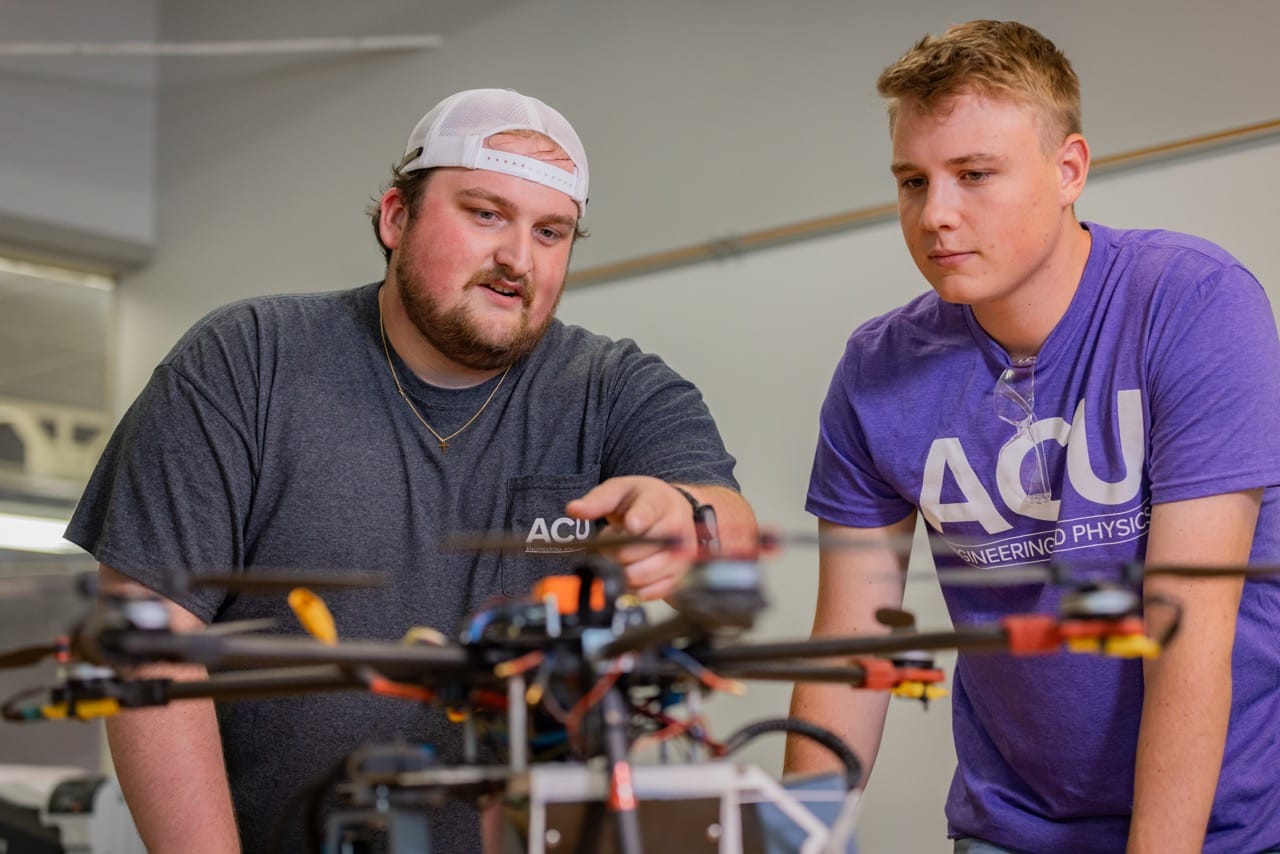Learn More
Are you interested in Engineering?
At ACU, we are here for you on your journey to success, and it starts with answering your questions. Let us connect you with the information you need to navigate your next steps.
Complete the form to learn more about earning a degree in engineering.
Ignite your passion at ACU!
Come along side us as we marvel at God’s handiwork in the laws of the universe, and seek to understand and apply those principles to solve big problems while improving the lives of people around the world. A degree in engineering from ACU will ignite your love of learning and help you grow in confidence as you become a world changer.
B.S. in Electrical Engineering
Degree Details
Learn more about this degree plan in the course catalog at the button below.
View Catalog
Related Degrees
Find specific program information for each concentration at the “View Catalog” button.
Required
University Hours: 54
Major Hours: 74
Electives: 0
Total Required: 128 credit hours
Example Coursework
Electronic Devices
Introduction to Embedded Systems
Signal Processing
Power Electronics and Electromechanics
Department
Career Options
Consider the wide range of exciting careers available with a bachelor’s in electrical engineering.
- Power Electronics Engineer
- Biomedical Engineer
- Aerospace Engineer
- Nuclear Engineer
- Electrical Engineer
See a more extensive career list below.
Curriculum

ACU’s electrical engineering program will equip you with the knowledge needed to thrive in a rapidly evolving field. In addition to technical skills, you will be prepared to present confidently, communicate effectively and work well in teams, from the first day on the job.
Experiential Learning
Our programs incorporate real-world problems from corporate, public and non-profit organization partners in junior and senior clinic projects. These experiences help you learn from practicing engineers, acquire real-world design experience for a client and begin a strong personal network on which to build a career.
You’ll also be given plenty of opportunities to use your knowledge to help others in the community and around the world.
Student Opportunities
- Research – There are various cross-disciplinary research opportunities in the department.
- Missional engineering – You can travel internationally and get hands-on engineering experience and real-world application while sharing the Gospel with others.
- Study Abroad- You can take classes Spain or Germany.
- Student led organizations- You can be a member of the American Society of Civil Engineering (ASCE), the American Nuclear Society (ANS), the ACU Robotics VEXU Team, the Society of Automotive Engineers (SAE) and/or the Society of Women Engineers (SWE)
Careers

ACU’s electrical engineering degree opens doors to diverse career paths, including:
- Electronics engineer
- Systems engineer
- Control systems engineer
- Telecommunication engineer
- Hardware engineer
- Embedded systems engineer
- Instrumentation engineer
- RF (radio frequency) engineer
- Power electronics engineer
- Renewable energy engineer
- Aerospace engineer
- Biomedical engineer
- Research and development (R&D) engineer
ACU’s undergraduate General Engineering program has been accredited by the Engineering Accreditation Commission of ABET for college and university programs in applied science, computing, engineering, and engineering technology.
ABET accreditation assures that programs meet standards to produce graduates ready to enter critical technical fields that are leading the way in innovation and emerging technologies, and anticipating the welfare and safety needs of the public.
Once you graduate from ACU with a Bachelor of Science in Engineering, you will be equipped to work in a number of engineering positions.
New programs as of 2024 (Civil, Electrical, and Mechanical engineering); retroactive ABET accreditation for each program will be sought as soon as the first student graduates under each of these degree plans, according to ABET requirements.
The ACU engineering program strongly supports the university’s mission of educating students for Christian service and leadership throughout the world. In support of the university mission and in response to the needs of program constituents, the Program Educational Objectives (PEOs) are that within a few years of graduation:
- Alumni succeed in engineering practice or other fields that value design using analysis, problem solving, communication, and other professional practice skills.
- Alumni continue in life-long learning that builds upon foundational undergraduate knowledge through graduate study, career-specific or other professional training.
- Alumni glorify God through thoughtful integration of work and life-facilitating service to others through their profession.
The following student outcomes will prepare ACU engineering students to attain the program educational objectives:
- an ability to identify, formulate and solve complex engineering problems by applying principles of engineering, science and mathematics
- an ability to apply engineering design to produce solutions that meet specified needs with consideration of public health, safety and welfare, as well as global, cultural, social, environmental and economic factors
- an ability to communicate effectively with a range of audiences
- an ability to recognize ethical and professional responsibilities in engineering situations and make informed judgments, which must consider the impact of engineering solutions in global, economic, environmental and societal contexts
- an ability to function effectively on a team whose members together provide leadership, create a collaborative and inclusive environment, establish goals, plan tasks and meet objectives
- an ability to develop and conduct appropriate experimentation, analyze and interpret data, and use engineering judgment to draw conclusions
- an ability to acquire and apply new knowledge as needed, using appropriate learning strategies

